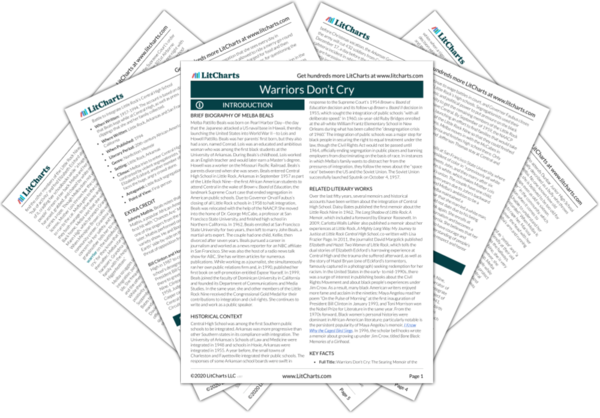Shortly after Melba and her family are overcharged and verbally intimidated by the grocer, Mr. Waylan, Grandma India places calls to her friends to discourage them from shopping at his store. She tries to get a group of them to patronize a shop “across town,” but none of them wants “to cause trouble.” In frustration, Grandma India reads aloud from her Bible the following passage: “And Ethiopia shall stretch forth her wings.” Grandma India uses the Scriptural passage to teach Melba that one day things will be different for black people. Though she might not see the changes, she explains assuredly that Melba’s lifetime will be different from hers. Melba is skeptical and “anxious,” worried that white people might always be in charge. Thus, Ethiopia becomes a symbol of black freedom and power. The Scriptural passage evokes an image of Ethiopia—historically, one of only two African nation that has never been colonized—as a bird longing to express its natural impulse to stretch its wings and take flight. Likewise, black people in 1950s America had a wish to be free—to attend school and to shop wherever they pleased, for example—without encountering abuse or intimidation.
Ethiopia Quotes in Warriors Don’t Cry
It’s Thursday, September 26, 1957. Now I have a bodyguard. I know very well that the President didn’t send those soldiers just to protect me but to show support for an idea—the idea that a governor can’t ignore federal laws. Still, I feel specially cared about because the guard is there. If he wasn’t there, I’d hear more of the voices of those people who say I’m a nigger […] that I’m not valuable, that I have no right to be alive [….] Thank you, Danny.
Early on Wednesday morning, I built a fire in the metal trash barrel in the backyard, fueled by my school papers. Grandma said it would be healing to write and destroy all the names of people I disliked at Central High: teachers, students, anyone who I thought had wronged me […]. Grandma India stood silent by my side as I fed the flame and spoke their names and forgave them […]. Finally she said, “Later, you’ll be grateful for the courage it built inside you and for the blessing it will bring.” Grateful, I thought. Never. How could I be grateful for being at Central High? But I knew she was always right.












